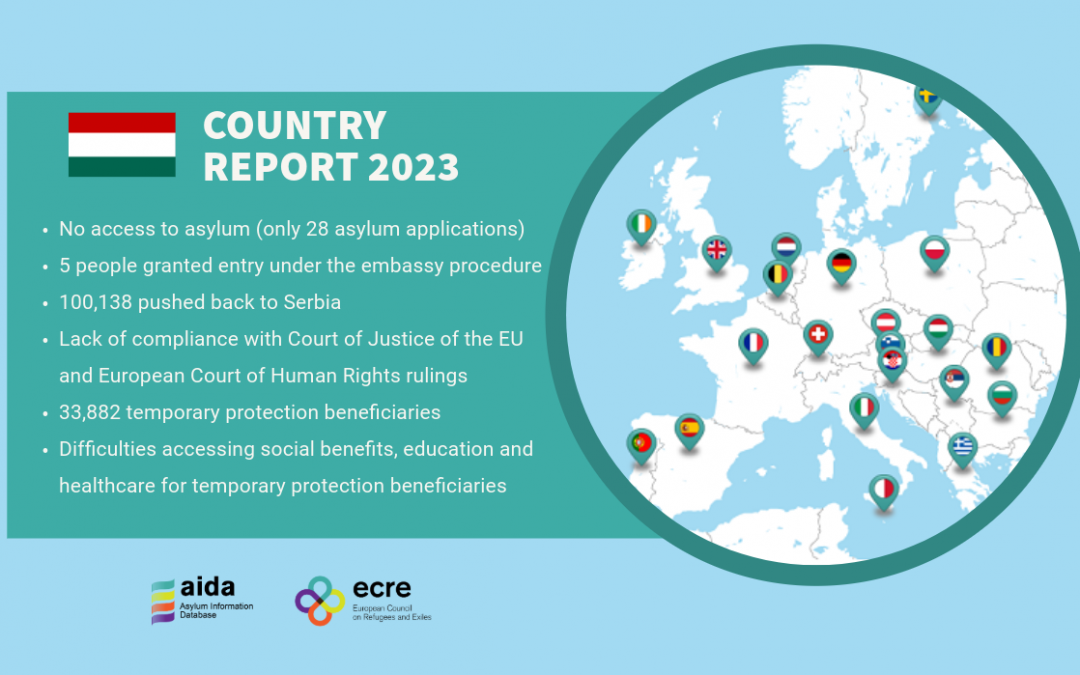The updated AIDA Country Report on Hungary provides a detailed overview of legislative and practice-related developments in asylum procedures, reception conditions, detention of asylum seekers and content of international protection in 2023. It also includes an annex which provides an overview of temporary protection (TP).
Statistics from 2023 illustrate how severely access to the asylum procedure in Hungary has continued to be hindered by the ongoing ‘embassy procedure’. In 2023, only 28 people managed to apply for asylum in Hungary (compared to 44 in 2022). In addition, only two statements of intent were lodged as part of the ‘embassy procedure’ (compared to 17 in 2022). Five Iranian nationals received recommendations to enter Hungary following a two-year court case in which a court ordered the authorities to issue them. In total, in 2023, 11 people were granted refugee status, 11 were granted subsidiary protection and nine had their applications rejected in merit in the first instance asylum procedure. People who applied for asylum inside Hungary without having gone through the ‘embassy procedure’ continued to be denied access to the asylum procedure on the grounds that their requests were “impossible” under the current legal framework. The Hungarian authorities continued to refuse to implement the Court of Justice of the EU’s (CJEU) judgment that found their system incompatible with EU law. At the same time, more than 100,000 people were pushed back to Serbia, despite a CJEU judgment and five European Court of Human Rights judgments condemning this practice.
NGOs continued to be prevented from accessing detention facilities. As a result, no monitoring could be carried out and no services such as free legal counselling, social assistance or psychosocial and therapeutic care could be provided, apart from in a small number of cases. Hungary’s previous practice of transit zones (which was discontinued in 2020) was deemed to be in breach of people’s human rights in another five cases in 2023, and Hungary’s asylum detention practices were judged to be in breach of individuals’ rights to liberty in seven additional judgments.
Compared to 2022, many more beneficiaries of international protection had their applications for Hungarian citizenship rejected in 2023. During the same period, the authorities initiated substantively fewer withdrawal procedures in 2023, although this may have been partially due to the overburdening of the National Directorate-General for Aliens Policing which was also in charge of TP procedures.
There were 33,882 TP beneficiaries in Hungary in 2023 (17% increase from 2022). Hungary’s TP framework continued to be incompatible with EU law in 2023 as third country nationals, including those with a permanent residence permit in Ukraine, were still ineligible for any form of adequate protection. Since January 2023, third country nationals without travel documents who had been residing in Ukraine before 24 February 2022 and who had left the country but then temporarily returned, have been denied entry into Hungary even if they may be eligible for TP. All people who have been issued with an entry ban issued by an EU member state are also denied entry into Hungary, regardless of their nationality and even if they are Ukrainian. Anyone who is denied TP is unable to access the asylum procedure in Hungary due to the ‘embassy procedure’.
Applicants for TP in 2023 were still unable to access reception conditions until their status had been confirmed, a process which can take up to three months. Notably, they could not receive the subsistence allowance: the only type of financial allowance available under TP. However, unlike in 2022, there were no substantive delays in the implementation of the procedure in 2023.
Due to changes in legislation, apart from very limited exceptions (e.g. pregnant women, people with disabilities, the elderly and minors), in 2023, unemployed TP beneficiaries were denied access to general state-funded housing solutions, which also included food provision. This may have led to family separation in cases in which some family members were able to access this type of housing while others were not. The unemployed TP beneficiaries who were unable to access the general state-funded housing could still be provided with accommodation in one of the two asylum reception centres, but without food provision. Inclusion into society was also several hindered in 2023 by a lack of Hungarian language courses, including in schools. This led many families to choose to continue Ukrainian education online. Finally, TP beneficiaries continued to struggle to access healthcare due to doctors’ lack of knowledge about their rights.
The full report is available here and the annex on temporary protection is available here.
For more information about the AIDA database or to read other AIDA reports, please visit the AIDA website.

